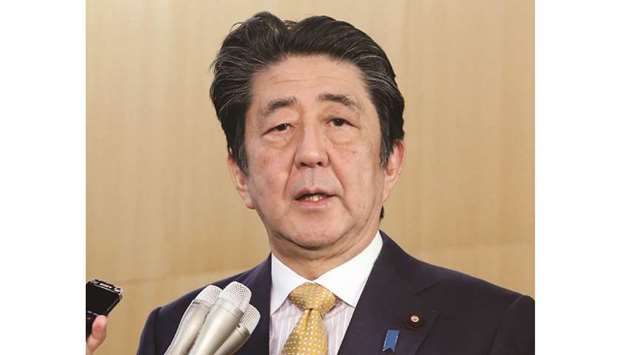South Korea yesterday said it would not suspend its intelligence-sharing deal with Japan, in a dramatic, last-minute reversal that signalled a breakthrough after months of frigid relations over their painful wartime history.
The decision, announced by South Korea’s presidential Blue House, is likely to be hailed by Washington, which has put pressure on its two Asian allies to set aside a long-burning feud and maintain the pact.
The General Security of Military Information Agreement (GSOMIA) is seen as linchpin of trilateral security co-operation in Asia.
The diplomatic thaw also has potential implications for trade. Japan has this year put export curbs on materials used to make semiconductors, threatening the global supply chain of chips that are a pillar of the South Korean economy. “This government has decided to suspend our notice of Aug 23 on the Korea-Japan intelligence agreement on the condition the agreement can be terminated at any time,” said Kim You-geun, deputy director of South Korea’s national security office.
“Japan has expressed its understanding,” Kim said in a briefing. The announcement came just hours before the intelligence-sharing pact was due to expire.
South Korea had given Japan notice in August that it would stop sharing intelligence, retaliating after Tokyo put the restrictions on the export of the chip components. Japanese Prime Minister Shinzo Abe said South Korea had made a “strategic decision” in sticking with the intelligence-sharing pact and that bilateral relations were vital.
Japan’s trade ministry said it hoped to hold talks with South Korea on export controls but it would not immediately put South Korea back on the trade “white list” that fast-tracks exports to the neighbouring country.
Speaking in Nagoya, where a G20 ministerial meeting was underway, Japan’s Foreign Minister Toshimitsu Motegi said security co-operation between the two countries was crucial. “My understanding is that the South Korean government took this strategic decision, given the current security environment,” Motegi told reporters.
Motegi said he was due to meet his South Korean counterpart later yesterday. In an earlier sign of the discord, the South Korean minister had not formally confirmed her attendance at the G20.
A South Korean official said the suspension of the earlier move to scrap the intelligence agreement was temporary but there was no deadline set yet to resolve the differences, and Seoul will terminate the pact if agreement is not reached.
South Korea’s decision yesterday came amid increasingly public displays of tension with the United States rare in the nearly seven decades of their alliance. The United States broke off defence cost talks this week after demanding that South Korea raise its annual contribution for maintaining the US contingent to $5bn, more than five times what it pays now.
Trump has long railed against what he says are inadequate contributions from allies towards defence costs. The United States is due to begin separate negotiations for new defence cost-sharing deals with Japan, Germany and Nato next year.
While the two US allies are both concerned by China’s increasing assertiveness in the region and the potential threat from North Korea, their relations remain troubled by grievances stemming from Japan’s 1910-45 colonisation of the Korean peninsula.
South Korea, which has said Japan must lift its trade restrictions, and Japan, which called for the security pact to be maintained, announced the developments hours before the pact was set to expire at midnight on Friday.
GSOMIA was sealed in 2016 after a years-long US push for a better joint response to North Korea’s growing military threat.

Japan’s Prime Minister Shinzo Abe speaks to the media, after South Korea’s decision on the military intelligence-sharing agreement, at his official residence in Tokyo yesterday.
